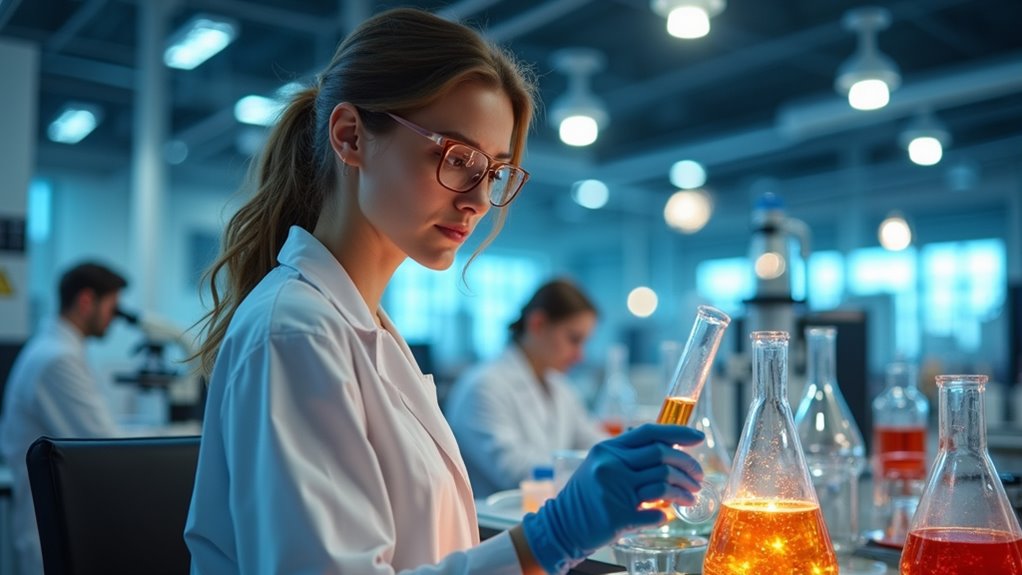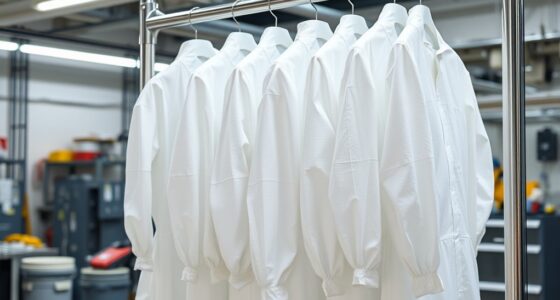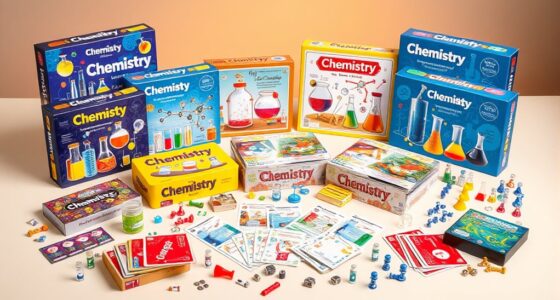If you major in chemistry, you have a range of exciting career options. You could work as an analytical chemist, designing experiments and analyzing substances, or become a chemical engineer, optimizing manufacturing processes. Other paths include toxicology, forensic science, water chemistry, environmental protection, and education. Skills in communication, regulation, and sustainability also open doors in policy and advocacy. Keep exploring these options to discover which path fits you best and open your future success.
Key Takeaways
- Chemistry majors can pursue careers in research, industry, environmental, regulatory, forensic, education, and communication fields.
- Roles include analytical chemists, chemical engineers, environmental scientists, toxicologists, and science educators.
- Skills such as data analysis, instrumentation, regulatory knowledge, and communication are essential across careers.
- Many positions require advanced degrees or certifications, especially in specialized or regulatory fields.
- Interdisciplinary collaboration and sustainability considerations are increasingly important in chemistry-related careers.
Analytical Chemist
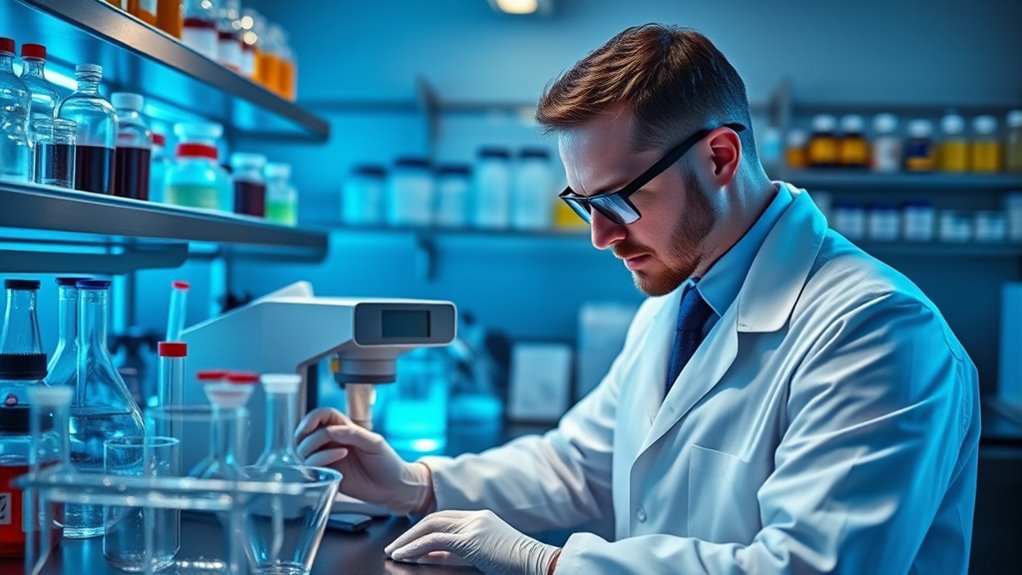
If you’re interested in uncovering the chemical makeup of substances, becoming an analytical chemist offers a hands-on role in scientific discovery. You’ll analyze chemical compositions with techniques like spectroscopy and chromatography, helping industries guarantee product quality and safety. Analytical chemistry is essential for understanding what matter is and its quantity, making your role vital for accurate analysis. Conduct controlled experiments to study how materials behave and understand their structures. Your work involves preparing detailed reports and collaborating with teams across fields such as pharmaceuticals, forensics, and environmental science. You’ll also make certain testing complies with health and safety standards. Proficiency in instruments like HPLC and GC-MS, along with data analysis skills, are essential. Your work environment is mainly lab-based, with some fieldwork or office time for data review. This role provides opportunities to develop into senior chemist, quality assurance director, or regulatory specialist. Additionally, staying current with scientific advances enhances your ability to contribute to innovative solutions in your field.
2. Chemical Engineer
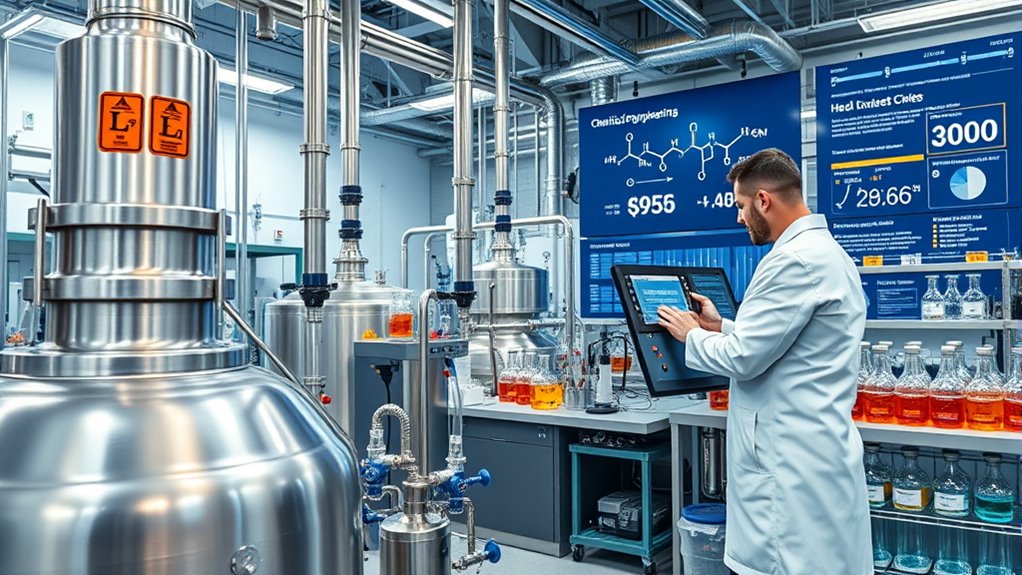
As a chemistry major, you might find yourself moving beyond laboratory analysis to designing and optimizing chemical processes that turn raw materials into useful products. You’ll develop manufacturing processes for items like gasoline, detergents, pharmaceuticals, and paper. Your tasks include analyzing desired outcomes, creating process flow diagrams, and evaluating feasibility. You’ll balance safety, efficiency, cost, and environmental impact in your designs. Collaborating with cross-functional teams, you’ll enhance existing processes for better quality and productivity. Understanding process optimization principles can help improve process performance and reduce waste.
3. Toxicologist
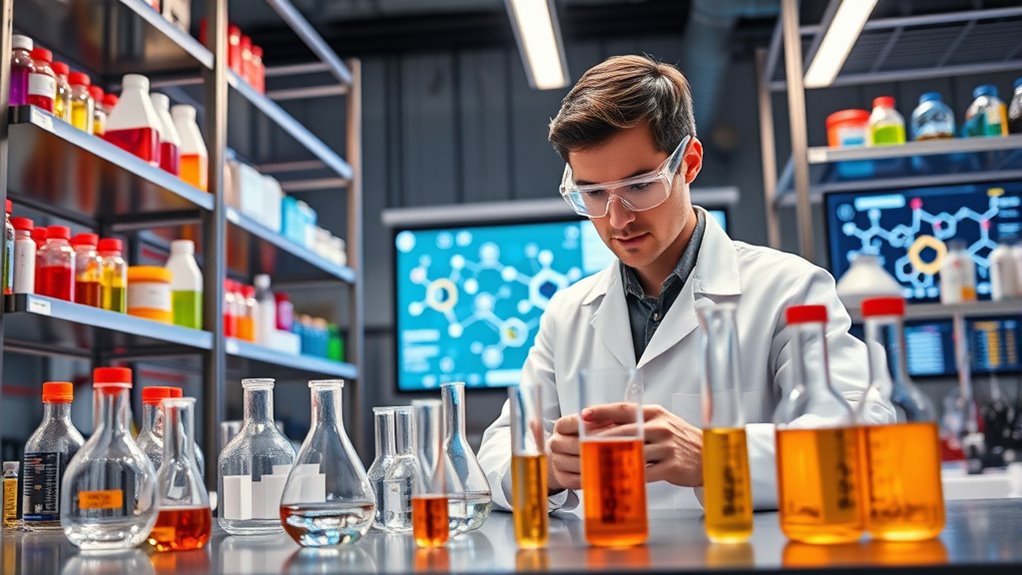
Have you ever wondered how chemicals impact health and safety in everyday life? As a toxicologist, you investigate the adverse effects of chemicals on humans, animals, and the environment. Your work can include diagnosing poisoned patients in clinical toxicology or evaluating workplace hazards in occupational toxicology. Combining multiple scientific disciplines, toxicologists utilize a range of laboratory experiments, data analysis, and interpretation of results to understand chemical effects. You might also provide essential data for legal cases through forensic toxicology. Most of your job involves laboratory experiments, data analysis, and interpreting results. You could work for government agencies, private companies, universities, or forensic labs. Typically, you’ll need a background in chemistry or biology, often with a master’s or Ph.D., plus certifications. Your skills in analysis, communication, and problem-solving will help you contribute to public health, safety standards, and policy development, making a real difference in society. Additionally, staying informed about AI safety vulnerabilities can be crucial when employing automation and data analysis tools in toxicology research.
4. Chemistry Teacher or Science Communicator

Teaching chemistry or communicating scientific concepts allows you to inspire curiosity and foster understanding across diverse audiences. You’ll develop and deliver lesson plans on chemical properties, reactions, and analysis techniques, guiding students through hands-on lab activities safely. These roles often require strong communication skills and a passion for education. Some roles combine teaching with research, especially in colleges and universities. Your job involves translating complex ideas into clear explanations, making science accessible to students and the public. With over 48,500 chemistry teachers in the U.S., the field offers stable employment, especially in higher education, where growth is steady. Most professionals hold advanced degrees, including master’s, doctoral, or postdoctoral training. The median salary hovers around $85,810 annually, with opportunities for career advancement and specialization. Your work helps shape future scientists and promotes scientific literacy, and a background in science communication can enhance your ability to reach wider audiences.
5. Water Chemist

Water chemists play a vital role in safeguarding public health and environmental quality through the analysis and management of water sources. You’ll examine water samples from drinking supplies, natural bodies, and industrial processes to detect pollutants like heavy metals, pathogens, and chemicals. Monitoring water quality is essential for early detection of contamination. Your work involves laboratory testing, field sampling, and monitoring sites to guarantee water quality meets safety standards. Staying current with environmental regulations is crucial to ensure compliance and implement effective water treatment strategies. You might work for government agencies, private firms, or industrial companies, focusing on maintaining water treatment systems, adjusting chemical dosing, and balancing pH levels. Your reports support regulatory compliance and environmental inspections. Strong chemistry skills, analytical techniques, and understanding environmental regulations are essential. As a water chemist, you contribute to clean water access, pollution prevention, and sustainable management, making a real impact on public health and ecosystems.
6. Pharmaceutical Chemist

Ever wondered how new medicines are brought from concept to pharmacy shelf? As a pharmaceutical chemist, you research and develop new chemical compounds for medicinal use by synthesizing and testing drug candidates. You analyze their physical and chemical properties to understand how drugs interact with human tissue, helping improve efficacy and reduce side effects. This process requires a comprehensive understanding of chemistry principles and rigorous laboratory techniques. Your role involves evaluating existing drugs, conducting studies to determine the best dosages, and optimizing formulations for therapeutic use. You work mainly in laboratories, handling hazardous chemicals under strict safety protocols. Your work environment includes pharmaceutical companies, biotech firms, and research labs. To excel, you need a solid background in organic and medicinal chemistry, analytical skills, and attention to detail. Your efforts directly impact the development of safer, more effective treatments for various diseases.
7. Regulatory Affairs Specialist

Have you ever wondered how companies guarantee their products meet all legal and safety standards before reaching consumers?
As a Regulatory Affairs Specialist, you analyze new and existing regulations to ensure compliance with global policies. You review marketing, legal, and technical documents like clinical research reports to verify adherence.
Your role involves preparing and submitting regulatory documents for product approval across different jurisdictions, collaborating with R&D, quality assurance, and legal teams to develop effective strategies.
You also monitor post-market safety, addressing adverse events or complaints.
Your work ensures products meet industry-specific regulations before launch, responds to regulatory inquiries, and supervises the entire development lifecycle. Utilizing self-watered plant pots as a metaphor, you maintain consistent oversight to prevent issues and promote healthy growth—whether in plants or regulatory compliance.
Strong attention to detail, communication skills, and knowledge of scientific and regulatory principles are essential in this dynamic, cross-functional role.
8. Agricultural Chemist
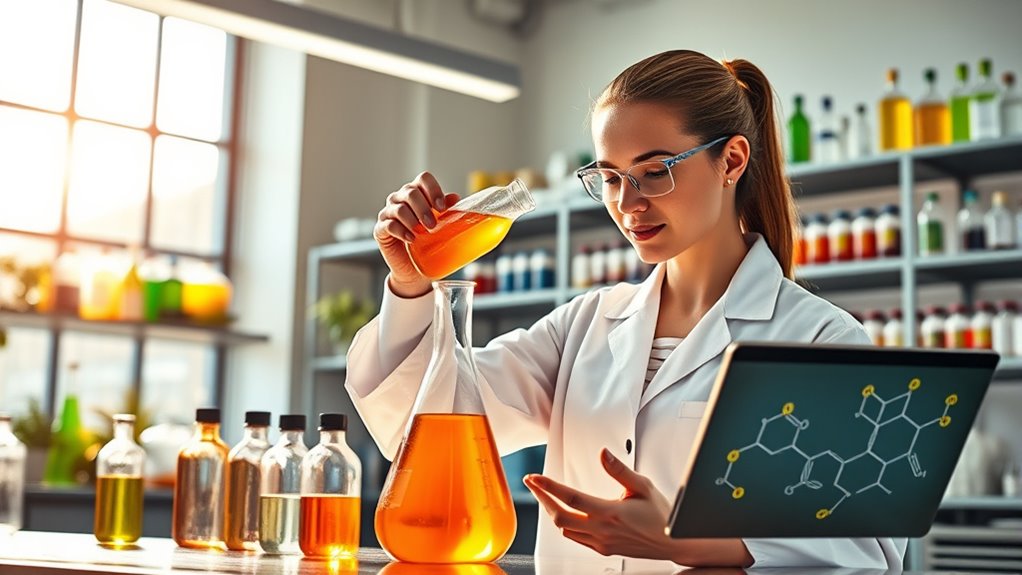
As a regulatory affairs specialist guarantees products meet legal standards before market release, agricultural chemists focus on developing and applying chemicals that boost crop yields and protect against pests. Your work involves designing pesticides, herbicides, and fertilizers, often collaborating with biologists, toxicologists, and agronomists on interdisciplinary projects. You research biochemical reactions affecting plant and animal growth to improve agricultural outputs and monitor environmental impacts, ensuring sustainability. A bachelor’s degree in chemistry, agricultural science, or related fields is essential, with advanced degrees benefiting those pursuing research or academic roles. Understanding state-specific tax laws can also influence project funding and industry regulations. Your efforts contribute to crop protection, food safety, and environmental health, addressing challenges like pest resistance and ecological preservation. As demand for sustainable food production rises, agricultural chemists play a crucial role in meeting global food security needs.
9. Forensic Scientist or Researcher
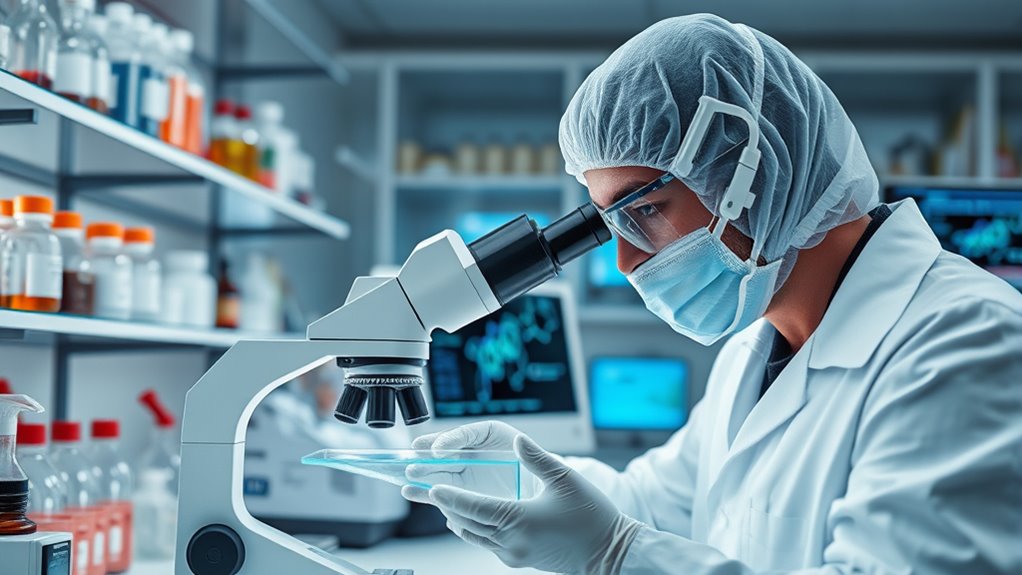
If you enjoy solving complex puzzles and applying scientific principles to real-world problems, becoming a forensic scientist or researcher could be a rewarding career for you. You’ll analyze evidence like biological samples, chemicals, and digital data using advanced techniques. Participating in crime scene investigations, collecting and documenting evidence, and preparing detailed reports are core tasks. You’ll also testify in court, explaining forensic findings clearly. Success requires strong communication, critical thinking, and a solid understanding of chemistry and biology. Here’s a quick overview: attention to detail is essential for accurately identifying and documenting evidence at every stage.
| Skills Needed | Work Environment |
|---|---|
| Analytical skills | Forensic laboratories |
| Communication skills | Crime scene investigations |
| Ethical standards | Collaboration with law enforcement |
| Time management | Specialized fields like DNA, toxicology |
| Technical proficiency | Continual skill updates |
10. Environmental Chemist

Building on your interest in applying science to real-world challenges, becoming an environmental chemist offers a chance to directly impact ecological and public health. You’ll study how chemicals influence ecosystems and human well-being, working both in labs and in the field.
Your skills in chemical analysis, data interpretation, and understanding environmental regulations are essential. To start, a bachelor’s in chemistry or environmental science is typical, but advanced degrees can open doors to research and leadership roles.
Your responsibilities include risk assessment, hazardous waste management, onsite remediation, and preparing reports. You’ll use tools like chromatography, spectroscopy, GIS, and computational models to analyze environmental samples.
Opportunities exist in government agencies, private firms, research institutes, NGOs, and academia, with potential for career growth and specialization.
Frequently Asked Questions
What Certifications Are Required for Careers in Chemical Analysis?
You’ll find that certifications like Certified Quality Analyst (CQA) and Certified Chemical Technician (CCT) boost your credibility in chemical analysis roles. These credentials validate your skills in quality assurance, laboratory procedures, and instrumentation.
Additionally, specialized certifications from organizations like ASCP and ASQ can help you stand out. While a chemistry degree is essential, earning relevant certifications demonstrates your expertise and commitment, increasing your job prospects and potential salary.
How Do I Transition From Academia to Industry Chemistry Roles?
Imagine your academic journey as a well-built bridge. To cross into industry, you need to strengthen your foundation with relevant skills and networking.
Attend industry events, seek internships, and tailor your resumé to highlight practical experience. Embrace continuous learning, certifications, and mentorships.
Like a sturdy bridge, your progression becomes smoother when you actively adapt, connect, and demonstrate your value to potential employers.
What Are the Typical Career Advancement Opportunities in Chemical Engineering?
In chemical engineering, you start with entry-level roles like process design or production oversight.
As you gain experience, you can specialize in areas such as catalysis or polymer science.
With 5+ years, you can move into supervisory positions, managing teams.
Further advancement includes engineering management, overseeing budgets and projects, eventually leading to executive roles like plant manager or CTO after 15-20 years.
Continuous learning and networking boost your career growth.
Which Skills Are Most Important for Success in Environmental Chemistry?
Think of your skills as the compass guiding you through a vast environmental landscape. To succeed in environmental chemistry, you need sharp analytical skills to decode complex data, strong communication to share findings, and problem-solving to tackle issues head-on.
Being adaptable, detail-oriented, and passionate about conservation fuels your journey. Combining scientific knowledge with interpersonal skills helps you build relationships and lead projects, turning your passion into impactful action.
How Can I Gain Practical Experience in Forensic Science During My Studies?
To gain practical experience in forensic science during your studies, participate in laboratory simulations and experiments like DNA fingerprinting, ballistics analysis, and spectroscopy.
Engage in hands-on case studies and sensor-based experiments to apply forensic concepts to real-world scenarios.
Pursue coursework in forensic chemistry, learn to use advanced analytical techniques, and try at-home or classroom activities that mimic forensic lab procedures.
This hands-on approach helps build essential skills and prepares you for a career in forensic science.
Conclusion
With so many exciting career paths waiting, your chemistry degree opens doors to endless possibilities. But which one will you choose? Will you reveal hidden secrets as a forensic scientist, or transform industries as a chemical engineer? The next step could define your future in ways you never imagined. Stay curious, stay ambitious—your unique journey is just beginning, and the best is yet to come. The question is, are you ready to take that leap?
